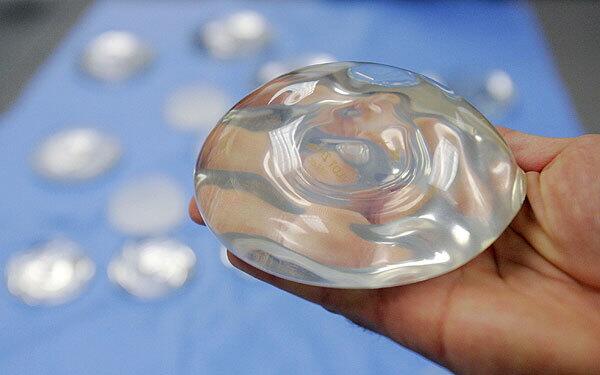
Here’s an unusual risk of playing paintball: A British woman’s breast implant reportedly exploded after she was hit in the chest by a paintball, which can travel at 190 mph.
Perhaps this particular incident should be filed under “dangers of implants” rather than the “dangers of paintball.” After all, it would not be the first time that high-impact events have caused breast implants to explode. Among the odd cases: A Bulgarian woman’s implants reportedly ruptured in a car accident, acting somewhat like an airbag and potentially saving her life.
Then there was Lydia Carranza, shot in the chest in 2009 by an assailant while working at a Simi Valley dental office. A Beverly Hills cosmetic surgeon claimed that Carranza’s implant kept the bullet fragments from reaching her heart and vital organs.
Moral of the story? If you absolutely have to get breast implants, avoid any potentially high-impact activities. (Donna McWilliam / Associated Press)

Apple co-founder Steve Jobs, who died in October at the age of 56, had a rare form of pancreatic cancer called pancreatic neuroendocrine cancer, which produces islet cell or neuroendocrine tumors.
This form is usually less aggressive than pancreatic exocrine cancer, and patients can live longer, with the average survival rate more than three years. Some people with the neuroendocrine form can live as long as 20 years. Several forms of treatment are available. Jobs was diagnosed in 2003 and had a liver transplant in 2009.
In some cases, removing a diseased liver entirely and replacing it with a donor liver is an option -- but liver transplants aren’t that common among people with this type of pancreatic cancer, said Dr. Craig Devoe, an oncologist at the North Shore-LIJ Health System in New Hyde Park, N.Y., who specializes in pancreatic cancer. But a transplant can be done when other options have run out or when the disease has spread to the liver. It’s not typically thought of as a cure.
Even after a liver transplant, the cancer can recur, which may have been what happened in Jobs’ case. “Probably nine out of 10 times it’s the recurrence of the cancer, but it’s also possible that he suffered from the toxicity of the drugs that he was taking,” said Dr. Jack Jacoub, a medical oncologist at MemorialCare Cancer Institute at Orange Coast Memorial Medical Center in Fountain Valley. Infections can also occur because the drugs that keep the body from rejecting the liver transplant suppress the immune system. (Paul Sakuma / Associated Press)








